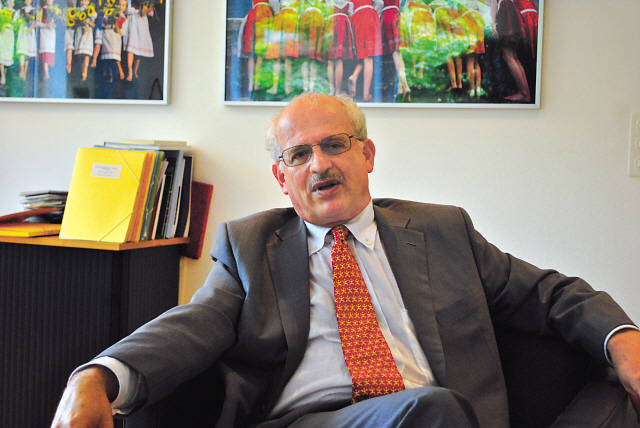Switzerland and Korea can expect a long future of good relations and increased economic ties, according to Swiss Ambassador Thomas Kupfer.
“I see two countries that don’t have major problems on the horizon,” said Kupfer, adding that both countries have enjoyed “very positive relations.”
And through these positive relations both countries could benefit from more cooperation in science and technology, which is considered a forte for Korea and Switzerland, according to the soon-to-depart ambassador.
Switzerland is considered one of the strongest countries in the field of statistics and rankings, with a strong presence in basic research, said Kupfer.
“I see two countries that don’t have major problems on the horizon,” said Kupfer, adding that both countries have enjoyed “very positive relations.”
And through these positive relations both countries could benefit from more cooperation in science and technology, which is considered a forte for Korea and Switzerland, according to the soon-to-depart ambassador.
Switzerland is considered one of the strongest countries in the field of statistics and rankings, with a strong presence in basic research, said Kupfer.

And because Korea is strong in applied research, Kupfer believes that both countries have “good potential” for cooperation.
According to the U.S. National Science Foundation, Korea spent almost 3.37 percent of its gross domestic product on research and development in 2008, one of the highest proportions in the world. In the same year, Switzerland spent three percent of its GDP on R&D.
Switzerland is home to the European Organization for Nuclear Research, which operates the world’s largest particle accelerator, the Large Hadron Collider.
The two governments have already begun to push for cooperation in nuclear physics.
Seoul and Bern have agreed to help develop joint science projects in hopes of enhancing exchanges between professors and students from both countries, according to the ambassador.
Korea and Switzerland have had a longstanding history in terms of economic relations, including a free trade agreement signed in 2006.
“We have a solid basis for intensifying the economic and trade relations which are a very important part of our relations,” said Kupfer, calling both countries “strong economic operators.”
Bilateral trade skyrocketed after signing the FTA, jumping by 111 percent from $1.74 billion in 2005 to $3.68 billion in 2011, according to data by the Korea International Trade Association.
And even before the FTA, the two countries have enjoyed an early leg up in trade. Korea and Switzerland’s bilateral trade first reached the $1 billion mark in 1994 and a record high of $8.15 billion in 1998.
However, because of Switzerland’s smaller consumer market, Korea has had a trade deficit with the European country since 2000. In 2011, Korea exported some $1.13 billion worth of goods while importing over $2.55 billion from Switzerland.
According to Kupfer, both countries are economically similar as well for a number of reasons.
Switzerland is a landlocked country that has close to no natural resources and is dependent on exports, which account for close to 90 percent of GDP at $308 billion in 2011. Switzerland is simultaneously one of the world’s largest exporters and importers, mainly to Germany, U.S., Italy and France.
And like Korea, Switzerland also has corporations that have a strong global presence, however, according to Kupfer, that is where the similarities end.
Swiss multinational corporations like Nestle and Swatch do not dominate the country’s economy, unlike Korea’s Samsung, Hyundai and LG.
“We have a huge number of very successful small and medium-sized enterprises,” said Kupfer.
And because Switzerland only has a population of 7.9 million, the majority of those companies are export-oriented and independent of the multinational corporations, according to the ambassador.
Switzerland’s main exports are divided into two “invisible” exports, banking and high-tech finished products from its industrial manufacturing base.
Kupfer said that increasingly many of these enterprises are looking at the Korean market.
“I see more and more medium-sized companies coming to Korea and trying to sell their stuff or joint ventures.”
Switzerland also serves a vital role on the Korean Peninsula as part of the Neutral Nations Supervisory Commission deploying over 1,000 Swiss officers over the past 59 years.
And one of the legacies that Kupfer will leave as ambassador here is “50 Years Switzerland-Korea,” a book that catalogs the half century the two countries have had diplomatic ties.
According to the ambassador, the embassy will also unveil the digital version of the book on the country’s national day in Seoul on Wednesday.
The digital is available at http://www.swissembassynews.kr/50years.
By Robert Lee (robert@heraldcorp.com)
-
Articles by Korea Herald





![[Graphic News] Number of coffee franchises in S. Korea rises 13%](http://res.heraldm.com/phpwas/restmb_idxmake.php?idx=644&simg=/content/image/2024/05/02/20240502050817_0.gif&u=)



![[Robert J. Fouser] AI changes rationale for learning languages](http://res.heraldm.com/phpwas/restmb_idxmake.php?idx=644&simg=/content/image/2024/05/02/20240502050811_0.jpg&u=)








![[Eye Interview] 'If you live to 100, you might as well be happy,' says 88-year-old bestselling essayist](http://res.heraldm.com/phpwas/restmb_idxmake.php?idx=652&simg=/content/image/2024/05/03/20240503050674_0.jpg&u=)
